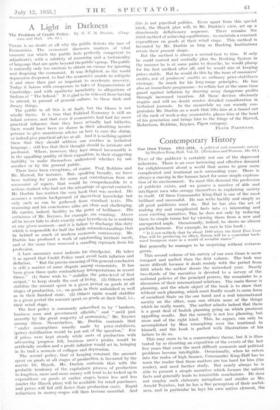A Light in Darkness
The Problem of Credit Policy. By E. F. M. Durbin. (Chap-
, man and Hall. 10s. 6d.)
THERE is no doubt at all why the public detests the race of Economists. The economist discusses matters of vital moment (on which the public feels perfectly competent. to adjudicate), with a subtlety of reasoning, and a technicality of language that are quite beyond thepublic's grasp. The public is naturally only too anxious to obtain an excuse for ignoring and despising the economist. It was delighted, as the world depression deepened, to find the economist unable to mitigate it and since then just as impotent to accelerate recovery. Today it listens with composure to tales of Expansionism ,at Cambridge, and with apathetic incredulity to allegations of Sadism at " The School." It is glad to be relieved from having to attend, in pursuit of general culture, to these dark and dreary things. The public in all this is at fault, but the blame is not wholly theirs. It is true that Political Economy is still an infant science, and that even if economists had had far more practical influence than they have actually had hitherto, there would have been no shame in their admitting incom- petence to give unanimous advice on how to cure the slump, or indeed give practical advice at all. And it is nothing against them that they should address one another in technical language ; still less that their thought should be intricate and profound. Where, however, they have sinned inexcusably is in the appalling quality of their exposition, in their staggering inability to make themselves understood whether by one another or by the general public. There have been exceptions, of course. Prof. Robbins and Mr. Harrod, for instance. But, speaking broadly, we have been waiting for years for some real contribution from an economist of repute, that would be comprehensible to a serious student who had not the advantage of special contacts. Mr. Durbin has written the very book that was needed. He assumes a certain background of theoretical knowledge but only such as can be gathered from standard texts. His reasoning and his conclusions alike arc clear and challenging. He carries, indeed, lucidity to the point of brilliance. His criticisms of Mr. Keynes, for example, are crushing. Above all he never fails to state exactly what hypothesis he is making at any given moment—and it is failure to discharge this duty which is responsible for half the futile misunderstandings that lie behind so much of modern economic controversy. Mr. Durbin has produced a work of outstanding intrinsic merit, and at the same time removed a standing reproach froth his profession. A bare summary must indicate his standpoint. He takes it as agreed that Credit Policy must avoid both inflation and deflation. " But the precise meaning of this general conclusion is still a matter of some dispute among economists. It has been given three quite contradictory interpretations in recent 'tithes." (1) Some wish to " stabilize the price-level of first output," to keep steady the cost of living. • (2) Others would stabilize the amount spent in a given period on goods at all stages of production, i.e., on goods in their unfinished as well as in their finished state. (8) Others again would stabilize in a given period the amount spent on goods at their final, i.e.,
their retail stage. . • The first policy is commonly subscribed to by " bankers, business men and government officials," and " until just recently by the great majority of economists," Mr. Keynes among , them. Nevertheless, Mr. Durbin - contends that " under assumptions usually made by price-stabilizers, (price) stabilization would be put out of the question." For if prices we're kept steady while costs of production with advancing 'progress fell, business men's profits • would be artificially swollen and a profit inflation would. set in, bringing in its trail a nemesis of collapse and. depression. •
The second policy, that of keeping :constant the amount spent on goods at all stages of production-, is favoured by the ascetic Dr: Hayek. Mr. • .Durbin contends that with the probable -tendency of the capitalistic process of production • to lengthen, more and more money will tend to; be locked up in expenditure on goods at earlier stages, hence less and less (under the Hayek plan) will be available for retail.pnrchases, and prices will fall still faster than production costs. Rapid reductions in money-wages will then become essential. And this :is not practical, politics. Even apart from this special hitch, the Hayek plan will, in Mr. Durbin's view, set up a disastrously deflationary sequence. There remains the third method of achieving equilibrium7to maintain a constant .expenditure on goods at their retail stage. This method is favoured by Mr. Durbin so long as Banking Institutions
retain their present shape. . •
But the method is always a second-best to him. If only he could control and centrally plan the Banking System in the manner he is at some pains to describe, he would plump for the first method after all, and he would aim at keeping prices stable. But he would do this by the issue of consumers' credits, not of producers' credits as ordinary price-stabilizers envisage. So much for his long-range principles. He has also an immediate programme—to reflate but at the same time guard against inflation by drawing away dangerous profits through increased taxation. All these devices obviously require and will no doubt receive detailed consideration in technical journals. In the meanwhile we can warmly con- gratulate Mr. Durbin on a work that lifts him at a bound out of the ruck of work-a-day economists, places him at the head of his generation and brings him to the fringe of the Harrod, Robertson, Robbins, Keynes, Pigou category.
FRANK PAKENIIAM.










































 Previous page
Previous page